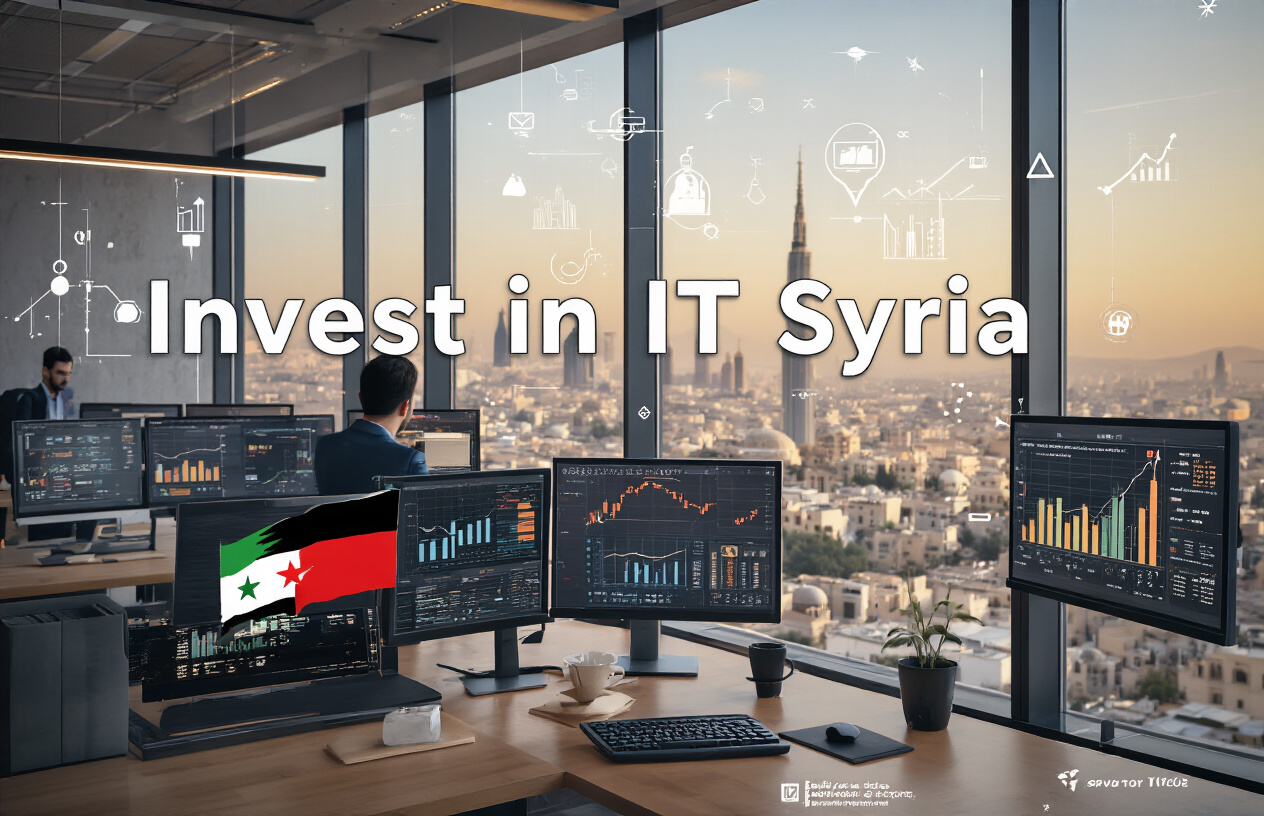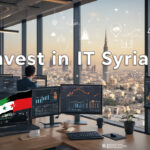
Syria’s IT sector is emerging as a surprising investment opportunity despite the country’s ongoing challenges. This guide is for international investors, venture capitalists, and tech entrepreneurs who want to explore untapped markets with significant growth potential.
The Syrian tech landscape offers unique advantages that savvy investors are starting to notice. Talented developers work at competitive rates, government initiatives support digital transformation, and the market has minimal competition from established players.
We’ll explore the current IT market landscape in Syria and identify the highest-return investment opportunities available today. You’ll also discover the strategic advantages that make Syrian IT investment attractive, plus get a clear roadmap for entry and risk management strategies to protect your investment.
Current IT Market Landscape in Syria

Growing demand for digital transformation services
Syrian businesses are racing to modernize their operations as they recognize the competitive advantages of digital solutions. Companies across manufacturing, retail, healthcare, and financial services are actively seeking cloud migration services, enterprise software implementation, and custom application development. The banking sector has shown particularly strong appetite for fintech solutions, with several major banks investing heavily in mobile banking platforms and digital payment systems.
Small and medium enterprises represent a massive untapped market for IT services. Many traditional businesses that previously operated entirely offline are now demanding e-commerce platforms, inventory management systems, and customer relationship management tools. The construction and real estate sectors have begun adopting project management software and digital marketing services, creating new revenue streams for IT service providers.
Professional services firms, including accounting practices, legal offices, and consulting companies, are driving demand for workflow automation and document management solutions. This shift has created opportunities for specialized IT providers who understand local business practices and can offer Arabic-language support alongside international-standard technology solutions.
Government initiatives supporting technology sector growth
The Syrian government has launched several programs designed to position the country as a regional technology hub. The Ministry of Higher Education established new IT faculties at major universities, while the Ministry of Economy created tax incentives for technology startups and foreign IT investors. These policies include reduced corporate tax rates for qualifying tech companies and streamlined business registration processes.
Public sector modernization projects have opened significant opportunities for private IT contractors. Government agencies are upgrading their internal systems, implementing e-governance platforms, and digitizing citizen services. The telecommunications authority has been actively working to improve internet infrastructure, including fiber optic network expansion and 4G coverage improvements.
Innovation hubs and technology parks in Damascus and Aleppo receive government backing through subsidized office space and utilities. The government has also partnered with international organizations to provide funding and mentorship programs for tech entrepreneurs, creating a more supportive ecosystem for IT business development.
Rising internet penetration and smartphone adoption rates
Internet usage in Syria has grown dramatically over the past three years, with penetration rates climbing from 34% in 2021 to over 52% by 2024. This growth has been driven by infrastructure improvements and decreasing data costs, making internet access more affordable for average citizens. Urban areas see penetration rates approaching 70%, while rural connectivity continues to expand through government infrastructure projects.
Smartphone adoption has reached a tipping point, with over 8.5 million active mobile internet users nationwide. Young Syrians, who make up a significant portion of the population, are driving demand for mobile applications, social media platforms, and digital entertainment services. This demographic shift has created opportunities for mobile app developers, digital marketing agencies, and content creation services.
The growing connected population has sparked demand for digital services across multiple sectors. Online education platforms have seen explosive growth, while e-commerce adoption has accelerated as consumers become comfortable with digital transactions. Local businesses are recognizing the need for web presence and social media marketing, creating a robust market for digital marketing services and web development companies.
Social media usage patterns show strong engagement with platforms like Facebook, Telegram, and WhatsApp, indicating a tech-savvy population ready to adopt new digital services. This foundation creates excellent conditions for IT investments targeting consumer-facing applications and services.
High-Return Investment Opportunities in Syrian IT

Software Development and Mobile App Creation
Syria’s growing pool of skilled developers presents exceptional opportunities for software development ventures. Local talent costs remain significantly lower than regional competitors while delivering comparable quality. Mobile app development shows particular promise, with smartphone penetration rising rapidly across urban centers.
Custom software solutions for local businesses create steady revenue streams. Many Syrian companies still rely on outdated systems, creating demand for modernization projects. Enterprise resource planning (ERP) systems, customer relationship management (CRM) platforms, and inventory management solutions offer substantial returns.
Mobile gaming represents an untapped goldmine. Syrian developers have created successful games that gained international recognition, proving local capability. Educational apps targeting Arabic-speaking markets show strong potential, especially with increasing digitalization of learning.
Fintech applications addressing local banking limitations could capture significant market share. Payment processing apps, digital wallets, and microfinance platforms would serve underbanked populations while generating consistent transaction fees.
E-commerce Platform Development and Digital Marketplaces
E-commerce infrastructure remains underdeveloped in Syria, creating massive opportunities for early investors. Local businesses struggle with online presence, opening doors for comprehensive e-commerce solutions.
Building specialized marketplaces for Syrian products could tap into diaspora purchasing power. Platforms connecting Syrian artisans, food producers, and manufacturers with international buyers would generate commission-based revenue while supporting local economy.
B2B marketplaces deserve special attention. Syrian manufacturers need better distribution channels, while regional buyers seek reliable suppliers. Creating platforms that facilitate these connections could generate substantial transaction volumes.
White-label e-commerce solutions for small businesses represent another lucrative avenue. Many Syrian entrepreneurs want online stores but lack technical expertise. Offering customizable platforms with payment integration, inventory management, and shipping coordination would meet this demand.
Cross-border logistics integration within these platforms adds value. Partnerships with shipping companies and customs brokers would streamline international transactions, making Syrian products more accessible globally.
Cybersecurity Solutions for Local Businesses
Syrian businesses face increasing cyber threats as they digitize operations, yet cybersecurity awareness remains low. This knowledge gap creates opportunities for comprehensive security solutions.
Small and medium enterprises (SMEs) need affordable security packages. Basic antivirus, firewall management, and employee training programs could capture this market segment. Subscription-based models ensure recurring revenue.
Banking and financial institutions require advanced security measures. Multi-factor authentication systems, fraud detection algorithms, and secure communication platforms command premium pricing in this sector.
Government contracts offer substantial revenue potential. Public institutions need secure communication systems, data protection protocols, and network monitoring solutions. These projects typically involve larger budgets and longer-term commitments.
Cybersecurity consulting and training services complement technical solutions. Many organizations need security assessments, policy development, and staff education programs. These services require minimal infrastructure investment while generating high margins.
Cloud Computing and Data Management Services
Syrian businesses increasingly recognize cloud computing benefits but lack local providers they trust. Building data centers within Syria addresses sovereignty concerns while capturing growing demand.
Infrastructure-as-a-Service (IaaS) solutions targeting local businesses could dominate this emerging market. Virtual servers, storage solutions, and network services would serve companies wanting to modernize without major hardware investments.
Data backup and recovery services address critical business needs. Many Syrian companies lost data due to infrastructure challenges, creating awareness of backup importance. Automated cloud backup solutions with local support would attract customers willing to pay premium prices.
Software-as-a-Service (SaaS) platforms adapted for local needs show strong potential. Accounting software supporting Syrian regulations, HR management systems, and project management tools could capture significant market share.
Disaster recovery services specifically designed for Syrian conditions would command high premiums. Companies need solutions addressing power outages, internet connectivity issues, and other local challenges. Hybrid cloud solutions combining local and international infrastructure could provide optimal reliability.
Strategic Advantages of Syrian IT Investment

Access to Highly Skilled Technical Talent at Competitive Rates
Syria’s education system has historically produced exceptional software engineers, data scientists, and IT professionals. Despite regional challenges, the country maintains several prestigious technical universities that continue graduating thousands of qualified developers annually. These graduates often possess strong mathematical foundations and problem-solving skills that rival those found in established tech hubs.
The talent pool includes professionals experienced in modern programming languages, cloud technologies, and emerging fields like artificial intelligence and blockchain development. Many Syrian developers have already worked remotely for international companies, making them familiar with global standards and agile development practices.
Salary expectations remain significantly below international rates while skill levels stay competitive. A senior software engineer in Syria might command 30-50% less than counterparts in neighboring countries, creating substantial cost advantages for investors without compromising on quality.
Lower Operational Costs Compared to Regional Competitors
Operational expenses in Syria present compelling advantages for IT investors. Office rental costs in major cities like Damascus and Aleppo remain fraction of what you’d pay in Dubai, Amman, or Beirut. Utility costs, internet infrastructure, and basic business expenses create favorable conditions for establishing development centers or IT service companies.
Government incentives for technology investments include tax breaks and simplified registration processes for IT ventures. The Syrian pound’s current valuation means initial capital requirements are substantially lower than regional alternatives.
Infrastructure improvements in recent years have enhanced internet connectivity and power stability in business districts, making Syria increasingly viable for tech operations that previously required more expensive regional locations.
Untapped Market Potential with Minimal Competition
The Syrian domestic market represents a largely untapped opportunity with over 18 million potential users and minimal competition from established tech companies. Local businesses across sectors desperately need digital transformation solutions, e-commerce platforms, and modern software systems.
Banking, healthcare, education, and retail sectors show particular demand for IT solutions. Many companies still rely on outdated systems, creating opportunities for investors to introduce modern technologies and capture significant market share quickly.
Regional expansion becomes easier once you establish a Syrian base, as the country’s strategic location provides access to broader Middle Eastern markets. Early movers in Syria’s IT space can build dominant positions before international competitors recognize the opportunity.
Essential Steps for Successful IT Investment Entry

Building partnerships with local technology universities
Syria’s academic institutions offer untapped potential for IT investment success. The University of Damascus, Tishreen University, and the Arab International University have established computer science and engineering programs producing skilled graduates annually. These partnerships create direct pipelines to fresh talent while providing opportunities for collaborative research and development projects.
Working with universities allows investors to shape curriculum development, ensuring graduates possess relevant skills for modern IT demands. Many institutions welcome industry partnerships through internship programs, joint research initiatives, and sponsored laboratories. The Syrian Virtual University, despite economic challenges, maintains strong connections with regional technology networks and can facilitate international collaborations.
Student projects often yield innovative solutions addressing local market needs. By sponsoring final-year projects or hackathons, investors gain early access to promising talent while supporting educational advancement. These relationships also provide market insights from young entrepreneurs who understand Syria’s unique technological landscape.
Understanding regulatory requirements and business registration
Navigating Syria’s business registration process requires careful attention to evolving regulations. The Ministry of Economy and Foreign Trade oversees foreign investment procedures, while the Syrian Investment Agency handles investment licenses for larger projects. Technology companies must register with both commercial and industrial registries depending on their operational scope.
Tax regulations for IT companies differ from traditional businesses, with potential incentives for technology startups and companies focusing on software export. The Syrian Computer Society provides guidance on industry-specific regulations and maintains updated information on telecommunications licensing requirements.
Banking relationships prove essential for foreign currency transactions and international payments. Several Syrian banks offer specialized services for technology companies, though due diligence on banking partners remains critical. Legal counsel familiar with both international business law and Syrian regulations becomes invaluable for contract negotiations and compliance management.
Establishing reliable internet infrastructure and office space
Internet connectivity forms the backbone of any successful IT operation in Syria. While infrastructure challenges exist, several options provide reliable service. Private internet service providers offer dedicated lines for businesses, and satellite internet solutions ensure backup connectivity. Many technology companies establish redundant internet connections to maintain operational continuity.
Damascus and Aleppo offer the most developed technology office spaces, with several business centers providing shared infrastructure and modern amenities. Co-working spaces have emerged as cost-effective alternatives, particularly for startups and smaller operations. These venues often include backup power systems, high-speed internet, and meeting facilities.
Power supply considerations require strategic planning. Uninterruptible power supply systems and backup generators become necessary investments for continuous operations. Many successful IT companies locate near industrial areas with more stable electrical infrastructure or invest in renewable energy solutions like solar panels.
Recruiting and training qualified development teams
Syria’s talent pool includes experienced developers who have worked remotely for international companies, bringing valuable global perspective to local operations. Professional networks through the Syrian Computer Society and local developer communities provide effective recruitment channels. LinkedIn and regional job platforms help identify candidates with specific technical skills.
Competitive compensation packages must account for local economic conditions while attracting top talent. Many successful companies offer professional development opportunities, international training programs, and flexible working arrangements as additional incentives. Remote work capabilities allow access to Syrian developers living in neighboring countries.
Training programs should address both technical skills and international business practices. English language proficiency often requires investment, as does familiarity with global software development methodologies. Partnerships with international training organizations can accelerate team development while building valuable professional networks for future expansion opportunities.
Risk Management and Mitigation Strategies

Diversifying Investment Across Multiple IT Sectors
Smart investors never put all their eggs in one basket, and Syrian IT markets offer plenty of baskets to choose from. Software development companies show strong growth potential, especially those focusing on mobile applications and web solutions for regional markets. E-commerce platforms are gaining serious traction as more Syrian businesses move online, creating opportunities in payment processing, logistics technology, and digital marketing tools.
Telecommunications infrastructure represents another solid investment avenue. Companies working on network expansion, 5G preparation, and rural connectivity projects often secure government contracts that provide stable revenue streams. Educational technology has exploded in popularity, with platforms serving universities and schools across the region showing impressive user growth.
Cybersecurity firms deserve special attention. Regional businesses face increasing digital threats, creating steady demand for security solutions, consulting services, and compliance tools. Data analytics companies also perform well, helping traditional businesses understand their digital transformation needs.
Consider spreading investments across different business sizes too. Established firms offer stability and proven track records, while startups bring innovation and rapid scaling potential. Geographic diversification within Syria helps balance regional economic variations. Damascus-based companies might focus on government contracts, while Aleppo firms often target manufacturing sector needs.
The key is building a portfolio that can weather sector-specific downturns. When one area struggles, others typically compensate, keeping your overall investment performance steady.
Developing Contingency Plans for Infrastructure Challenges
Syrian IT investments face unique infrastructure realities that require practical backup plans. Power outages remain frequent, so successful IT companies invest heavily in backup generators, uninterruptible power supplies, and alternative energy sources. Solar panels have become increasingly common among tech firms, providing both cost savings and reliability improvements.
Internet connectivity issues demand multiple solutions. Companies typically maintain relationships with several internet service providers, use satellite connections as backups, and design systems that can function with limited bandwidth. Cloud-first architectures help reduce dependency on local infrastructure, though data sovereignty concerns sometimes limit this approach.
Physical security considerations affect server locations and office setups. Many successful IT firms operate distributed teams, reducing single-point-of-failure risks. They also maintain secure data centers in multiple locations, ensuring business continuity even during local disruptions.
International partnerships become lifelines during infrastructure crises. Companies with strong relationships to regional tech hubs can relocate critical operations temporarily or access backup resources when needed. Remote work capabilities, accelerated by global trends, now serve as natural disaster recovery tools.
Banking and financial infrastructure challenges require creative payment solutions. Companies often maintain accounts across multiple financial institutions and develop relationships with international payment processors. Cryptocurrency adoption, while still limited, provides additional transaction flexibility for tech-savvy firms.
Building these contingency plans costs money upfront but prevents much larger losses during actual infrastructure failures.
Creating Flexible Business Models Adaptable to Market Changes
Syrian IT companies thrive when they build adaptability into their core business models. Revenue diversification protects against single-client dependency – companies balancing local contracts, regional projects, and international outsourcing work show remarkable resilience during economic shifts.
Subscription-based models provide predictable income streams while allowing quick service adjustments. Software-as-a-Service companies can modify features, pricing tiers, and target markets much faster than traditional licensing models. This flexibility proved invaluable during recent economic fluctuations when many clients needed service downgrades or payment plan modifications.
Talent management strategies require similar flexibility. Companies maintaining both full-time staff and freelancer networks can scale operations up or down based on project demands. Remote work capabilities, once seen as optional, now provide access to talent regardless of geographic constraints and reduce overhead costs significantly.
Product development approaches favor modular designs that can pivot quickly. Companies building core platforms with customizable modules can serve different industries or adapt to changing customer needs without complete rebuilds. This architectural flexibility enables rapid market expansion or contraction.
Partnership structures should include escape clauses and renegotiation triggers. Joint ventures with clear exit strategies protect investments while enabling beneficial collaborations. Strategic alliances that can expand or contract based on market conditions provide growth opportunities without permanent commitments.
Financial planning incorporates multiple scenarios – optimistic growth plans, steady-state operations, and contraction strategies. Companies maintaining cash reserves equivalent to 6-12 months of operations can survive unexpected market downturns while positioning for recovery opportunities.

The Syrian IT market presents a unique blend of untapped potential and strategic advantages that savvy investors shouldn’t overlook. From the growing tech talent pool to the government’s push for digital transformation, the landscape is ripe for those willing to take calculated risks. The key opportunities in software development, telecommunications infrastructure, and e-commerce platforms offer promising returns for investors who understand the local market dynamics.
Success in this emerging market comes down to smart planning and risk management. Start small, build strong local partnerships, and always have contingency plans in place. The Syrian IT sector might not be the easiest market to enter, but for investors who do their homework and move strategically, it could be one of the most rewarding. Take the time to research thoroughly, connect with local experts, and consider starting with pilot projects before making larger commitments.



